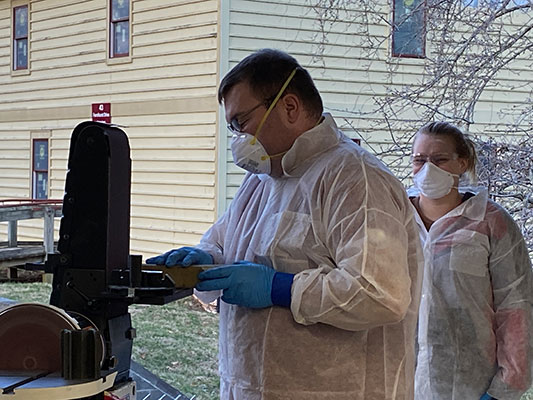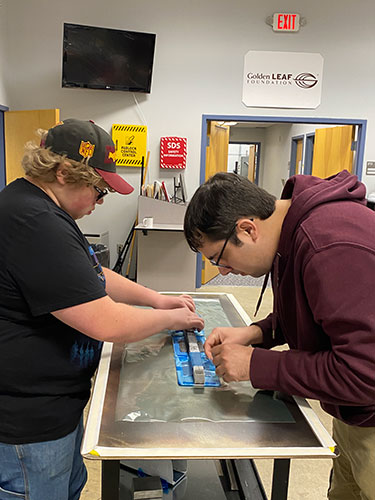North Carolina Community College System aids in efforts to rebuild jobs and businesses after devastation from Hurricane Helene.

By John Loyack, Vice President of Economic Development for the North Carolina Community College System
In September 2024, Hurricane Helene swept through Western North Carolina, devastating communities, businesses, and the local economy. The storm’s impacts were particularly severe in 27 counties. Known for their vibrant economies driven by tourism, manufacturing, and small businesses, these areas have faced significant challenges in rebuilding after widespread flooding, infrastructure damage, and job losses.
The Asheville Metropolitan Statistical Area (MSA) alone saw approximately 8,200 jobs lost in October, the month the storm finally left the area. Industries critical to the area’s economy, such as leisure and hospitality, bore the brunt of these losses. Small businesses and manufacturing businesses, which are the backbone of the region’s economy, faced extensive facility damage, inventory losses, and disruptions in operations as residents focused on recovery efforts.
With many businesses unable to reopen quickly and workers displaced from their roles, the region faced a dual challenge: how to support businesses in recovery while simultaneously helping individuals get back to income-producing work.
The North Carolina Community College System (NCCCS), through its NCEdge Customized Training Program, has emerged as a cornerstone of the hurricane recovery effort. NCEdge has a 65+-year record for creating tailored training programs that address the specific workforce needs of businesses across North Carolina. This program is one of the many smart ways that North Carolina uses more than just incentives to entice companies, like those in manufacturing, to do business in the state.
What sets NCEdge apart as a workforce development player is its emphasis on flexibility and responsiveness. Businesses partnering with NCEdge benefit from customized training plans designed to align with their specific goals, from upskilling current employees to preparing new hires. In the aftermath of Hurricane Helene, these traits proved invaluable as the workforce training needs suddenly shifted for companies of all types and sizes.
Another key component of the workforce recovery efforts has been the ApprenticeshipNC program, which collaborated with local employers to address workforce shortages caused by the storm. ApprenticeshipNC focuses on establishing paid apprenticeships that align with the now, immediate and long-term needs of area employers.
In the days following the hurricane, NCCCS conducted Rapid Response Assessments to identify workforce needs among the region’s largest and most affected employers. These assessments enabled the NCEdge and ApprenticeshipNC teams to prioritize training programs that addressed urgent recovery needs.
By collaborating with businesses directly, NCCCS ensured that its workforce initiatives were aligned with the realities on the ground in real time. Whether helping manufacturers adapt to supply chain disruptions or training hospitality workers to manage reduced operations, NCCCS provided a lifeline to the workforce navigating the challenges of recovery.
The extensive damage caused by Hurricane Helene created logistical hurdles for traditional training delivery methods. Many areas experienced prolonged power outages, limited internet access, and damaged transportation routes. To overcome these challenges, NCEdge and ApprenticeshipNC deployed innovative approaches to ensure accessibility for all participants. In regions with reliable internet connectivity, virtual training programs allowed workers to upskill from the safety of their homes. For areas where technology infrastructure was compromised, in-person training sessions were held at accessible locations.
These adaptive strategies highlighted NCCCS’s commitment to meeting workers where they were, ensuring that no one was left behind during the recovery effort, and helping the state to maintain its attractiveness for businesses in industries like electric vehicles, food and beverage, and more.
While large employers are critical drivers of the regional economy, small businesses form the foundation of Western North Carolina’s identity. Recognizing this, NCCCS, through its Small Business Center Network (SBCN), provided tailored support to help small businesses recover. From guiding business owners through disaster relief processes to offering technical assistance for reopening operations, SBCN played a vital role in stabilizing the region’s economy.
Beyond technical training, NCEdge and ApprenticeshipNC expanded their offerings to address the emotional toll of the disaster on workers and businesses. The hurricane left many employees grappling with stress, anxiety, and trauma, which, if unaddressed, could hinder recovery efforts.
To support the region’s emotional recovery, NCEdge worked with the local community colleges to offer mental health workshops through its training programs. These sessions equipped managers and employees with tools to navigate the psychological impacts of the disaster. This training focused on resilience-building, stress management, and fostering open communication within workplaces. By integrating mental health resources into its recovery efforts, NCCCS helped create environments where workers felt supported both professionally and personally.

As Western North Carolina rebuilds, the efforts of NCCCS and its workforce development programs offer a model for how workforce development can take a leadership role in economic recovery in the wake of a disaster. The NCEdge program’s focus on tailored training, innovative delivery methods, and holistic support has not only addressed immediate needs but also strengthened the region’s capacity to weather future challenges.

About the Author:
John Loyack is the Vice President of Economic Development for the North Carolina Community College System. In this role, Loyack leads the operation of the Economic Development Division, which includes NCEdge, ApprenticeshipNC, the BIONetwork, and the Small Business Center Network. The Economic Development team of NCCCS provides education, training, and support services for new, expanding, and existing business and industry in all 100 North Carolina counties through a network of 58 community colleges.
Scott Ellyson, CEO of East West Manufacturing, brings decades of global manufacturing and supply chain leadership to the conversation. In this episode, he shares practical insights on scaling operations, navigating complexity, and building resilient manufacturing networks in an increasingly connected world.